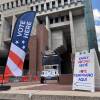"This time up, I figured this is kinda my last hurrah," said 84-year old Tom Larkin.
The Bedford resident has been active in politics since he volunteered for John F. Kennedy's presidential campaign in 1960. He figures that he’s cast hundreds — if not thousands — of votes in his lifetime. Presidential elections. Municipal elections. There were his years on the town school committee and his decades on the Democratic state committee.
But Dec. 14 will be different. On that day, Larkin will be one of six men and five women who will serve as Massachusetts’ 11 presidential electors this year.
The party whose candidate wins the popular vote in Massachusetts gets to select the state’s presidential electors. So, Massachusetts' 2020 electoral class is comprised of all Democrats — selected by the Democratic State Committee at a vote in September. They come from a range of backgrounds, and they have a range of motivations to volunteer for the job. But the ones who spoke with GBH News said they're honored to be part of the process — even if it's a process some of them think should change.
"It’s probably my most important vote of my life," Larkin said. "It’s gonna be a thrill for me."
The electors say earning a slot is competitive — there were more than 20 candidates this year— and it takes some personal campaigning to get the nod.
"I’m reaching the end of the road and kinda representing the activists within the Democratic party over the last 40 to 50 years," Larkin said.
For Medford lawyer Teresa Walsh, the decision to run for elector this year was less about a lifetime of work and more about this specific presidential election.
"For me it was a very personal thing," she explained.
Walsh is, among other things, an international election monitor for the Organization for Security and Cooperation in Europe. She was in Ukraine overseeing elections there in 2019 when President Donald Trump controversially recalled then-Ambassador Marie Yovanovitch, setting off a scandal that would eventually lead to his impeachment.
"I saw first-hand what it did to the embassy in Ukraine when then-President Trump interfered with a fine, career foreign service officer and ambassador," she said. "And I vowed that I would come back to the United States and I would do whatever I could in my power to work for a peaceful transfer of power within the institutions we have here within the United States."
Hingham’s Joe Kelly, an IBEW Local 103 electrician, also felt compelled to run this year — not by affairs abroad but by issues closer to home. Kelly is a relative newcomer to politics, and he said his reason for getting active in recent years is simple.
"There’s been a separation between working-class people in this country and the Democratic Party," Kelly said. "My goal was to rebuild that bridge and bring the voice of labor back to the Democratic Party, but also to bring the voice of the Democratic Party back to labor."
Kelly said there wasn’t a representative from labor among the candidates for the 2020 electoral class, and so he threw his hat in the ring.
"Growing up in an Irish Catholic, blue-collar family in South Boston, it’s gonna be the honor of a lifetime to vote for a guy who grew up with a similar background and is only the second Irish Catholic president in American history," he said.
American history weighed heavily on Easthampton Mayor Nicolle LaChapelle’s decision to run for elector, too. This year marks the 100th anniversary women earning the right to vote in the U.S.
"I felt urged on and inspired to participate," she said. "It was kind of my homage to the hundreds of thousands of women who got us to this point."
Like a number of electors who spoke with GBH News, LaChapelle has her issues with our electoral system and supports the idea of electing the presdient by popular vote. Stlll, she said that doesn’t diminish the gravity of what they are about to undertake.
"I’m honored to be a presidential elector, but we need to continue to evolve," LaChapelle said. "It would be really cool if I were the last electoral college class that was nominating a white man — and maybe the last electoral college class ever."
The votes will be cast on Monday at 3 p.m. After that they will be dispatched — like the 527 other votes from across the country — to Washington, D.C. Congress will tally them during a joint session on Jan. 6, 2021.




